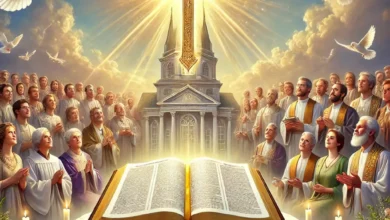
According to the Bible, when did Christianity begin?
According to the Bible, when did Christianity begin? To better understand a religion, knowing its founder is crucial. So, what do we know about Jesus?
Five of the top ten recent online searches with the phrase “Who founded…?” are related to people’s beliefs. But to better understand a religion, knowing its origin is essential. The origin of Christianity ranks third on this list. When did Christianity originate?
We can answer this question faster than a Google search – Jesus Christ. The origin of Christianity was brought about by Jesus Christ, who made faith in Him possible through His existence as one of the three persons of the Trinity – God the Father, God the Son, and God the Holy Spirit. Only He could have initiated Christianity (followers of Jesus Christ).
The definitive piece that tells us Jesus is the reason for the origin of Christianity is Hebrews 12:2, which explicitly names Jesus as “the founder and perfecter of our faith.” We can add Hebrews 2:5-11 as confirmation that Jesus is the founder of Christianity because it calls Him “the founder of their salvation.” Christians find their salvation solely through Jesus Christ. Therefore, we can equate our founder with our salvation (compare with Colossians 1).(when did Christianity begin?)
Read more : According the Bible, what was the religion of Christ
فرست محتوا
- 1 What do we know about the life of Jesus Christ? (The origin of Christianity)
- 2 What were the main characteristics of Jesus? (when did Christianity begin?)
- 3 What distinguished Jesus’ teachings from previous teachers? (when did Christianity begin?)
- 4 What happened to Jesus after the crucifixion? (when did Christianity begin?)
What do we know about the life of Jesus Christ? (The origin of Christianity)
The Apostle John wrote: “Jesus did many other things as well. If every one of them were written down, I suppose that even the whole world would not have room for the books that would be written.” (John 21:25). Not all the works He performed on earth are recorded, but as God, He was present in all the works of the Father documented throughout the Bible. However, for our purposes, we will focus on Matthew through Acts 1:1-11.
As an introduction to examining the life of Christ, consider this: Jesus fulfilled at least 300 Old Testament prophecies. The Jesus Film Project lists over 55 major ones for our review.
As far as His time here is concerned, the events of Jesus’ life include, but are not limited to:
- Jesus was conceived by the Holy Spirit and born of the Virgin Mary, whose husband was Joseph (Matthew 1:25a; Luke 2:1-7).
- Joseph and Mary fled to Egypt with Jesus after it was revealed that King Herod sought to kill Him. They returned to Nazareth after learning of Herod’s death (Matthew 2:13-23).
When He was 12 years old, during His family’s annual Passover trip to Jerusalem, His parents realized He was missing on the return journey. After three days of searching, they found Jesus in the temple, “sitting among the teachers, listening to them and asking them questions.” When His parents expressed their concern about His apparent indifference, Jesus replied, “Why were you searching for me? Didn’t you know I had to be in my Father’s house?” (Luke 2:41-52).
This event is a clear preview of Jesus’ ministry: He was always seeking the Father’s will and carrying it out with determination.
Shortly before He officially began His ministry at about 30 years old, Jesus was baptized by John the Baptist to “fulfill all righteousness” (Matthew 3:13-17).
Immediately after His baptism, the Spirit led Jesus into the wilderness for 40 days of fasting and then the temptation by Satan (Matthew 4:1-11).
Jesus spoke of the Kingdom, the Father, and the Holy Spirit. He performed signs, healings, and other miracles to reveal His glory, the first being the turning of water into wine at a wedding in Cana of Galilee (John 2:11).
Jesus began His ministry by calling His disciples (Matthew 4:18-22; Mark 1:16-34; Luke 5:1-11; John 1:35-51). The twelve apostles are named as a group in Matthew 10:2, Mark 3:14, and Luke 6:13. The Lord spent three fruitful years teaching and training His inner circle—the apostles. He prepared them for their roles after His resurrection and ascension.
During His earthly ministry, Jesus proclaimed the Kingdom of God (Matthew 3:2; 5:3; 5:5-7; 13:31-52; Luke 17:20-37), confronted and corrected false beliefs (Matthew 5:20; 9:34), and extended the Good News beyond the Jewish people (Luke 10:25-37; 17:11-19; John 4; 8:48).
The Jewish religious leaders were deeply disturbed because Jesus completely refused to submit to them. They plotted to kill Him (Matthew 15:12)—thus, the “game” played right into the hands of Almighty God’s plan of salvation (John 3:16-18).
Judas, one of Jesus’ disciples, betrayed Him, leading to His arrest, trial, flogging, crucifixion, and death (John 13:2).
As He told His disciples, His resurrection occurred three days after His death and burial (Matthew 12:40; Mark 8:31; John 2:19). (when did Christianity begin?)
What were the main characteristics of Jesus? (when did Christianity begin?)
Jesus exemplified these characteristics:
- Sinlessness (2 Corinthians 5:21; Hebrews 4:15; 1 John 3:5)
- A continuous life of prayer (Matthew 26:36; Luke 6:12; 9:28; 11:1; John 17:9)
- Obedience (John 6:38)
- Joy (Luke 2:10)
- Worship (John 4:21, 23)
- Righteousness (Matthew 3:15; 1 Corinthians 1:30; 2 Corinthians 5:21)
- Steadfastness (Luke 9:53)
- Mobile but dignified service (Matthew 8:20)
The list could go on (as the Apostle John said), but the above list reveals the life and nature of our Lord and Savior, Jesus Christ.
What distinguished Jesus’ teachings from previous teachers? (when did Christianity begin?)
A key verse briefly answers this question. After the Sermon on the Mount (which included the Beatitudes) to a large crowd, Matthew 7:28-29 says: “When Jesus had finished saying these things, the crowds were amazed at His teaching, because He taught as one who had authority, and not as their teachers of the law.”
Everything Jesus did and taught was with complete authority, and throughout the Gospels, Jesus repeatedly told us why He came. Jesus said He came to:
- “Do the will of the Father” (John 6:38).
- Be a light so that people would not remain in darkness (John 15:22).
- “Kindle a fire on the earth” (Luke 12:49).
- “Call and save sinners” and make eternal life with Him possible (Matthew 9:13; Mark 2:17; John 3:16; 12:27).
- Preach to “others” (Gentiles) as well as to the Jews (Mark 1:38).
- Give abundant life (John 10:10).
- Give us the Word of God (truth) (John 17:8).
- Bear witness to the truth (John 18:37).
- Fulfill the Law and the Prophets (Matthew 5:17).
- Bring a sword, not peace (Matthew 10:34).
- Cause division (Matthew 10:35; Luke 12:51).
- Be an ambassador in the name of His Father (John 5:43).
During His earthly ministry, Jesus overturned the traditions and practices of Jewish leaders (Matthew 9:11; Mark 7:11), and the Pharisees recognized their own ungodliness when Jesus addressed them (Matthew 23:2-36; Mark 12:38-40; Luke 11:37-52; 20:45-47). (when did Christianity begin?)
What happened to Jesus after the crucifixion? (when did Christianity begin?)
As prophesied, Jesus was in the grave from Friday afternoon to Sunday morning (according to Jewish day calculations, this was three days as Jesus said in Matthew 12:40). We all know Sunday was coming, and on that Sunday, “Mary Magdalene and the other Mary” (Matthew 28:1) went to the tomb, expecting their Lord’s body to be there.
But Jesus had already risen. Mary Magdalene saw Him and thought He was the gardener; she said, “Sir, if you have carried Him away, tell me where you have put Him.” Jesus said to her, “Mary.” She turned and said to Him in Aramaic, “Rabboni!” (Teacher) (John 20:15-16).
The Gospel of John continues with Jesus’ startling words to Mary:
“Do not hold on to me, for I have not yet ascended to the Father. Go instead to my brothers and tell them, ‘I am ascending to my Father and your Father, to my God and your God.'”
Then Jesus appeared to His disciples, and “after His suffering, He presented Himself to them and gave many convincing proofs that He was alive. He appeared to them over a period of 40 days and spoke about the kingdom of God” (Acts 1:3). He told them to wait for the Holy Spirit. They “will receive power when the Holy Spirit comes on you; and you will be my witnesses in Jerusalem, and in all Judea and Samaria, and to the ends of the earth” (Acts 1:8).
“And when He had said these things, as they were looking on, He was lifted up, and a cloud took Him out of their sight” (Acts 1:9).
“And while they looked steadfastly toward heaven as He went up, behold, two men stood by them in white apparel; who also said, ‘Men of Galilee, why do you stand gazing up into heaven? This same Jesus, who was taken up from you into heaven, will come in the same manner as you saw Him go into heaven'” (Acts 1:10-11).
If we search for Him with all our heart, we will find Him (Jeremiah 29:13). If we believe in Him and confess our sins, Jesus is faithful and just to forgive us and cleanse us from all unrighteousness (1 John 1:9).
The resurrection and ascension of Jesus are not only significant as signs and wonders, but they also solidify our belief in Jesus Christ, the founder of Christianity. (when did Christianity begin?)







